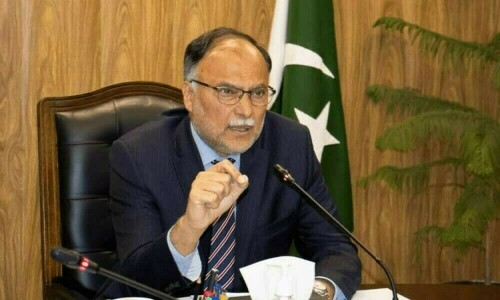Government to Allocate Rs1 Trillion for Development Projects in FY26
The government intends to allocate Rs1 trillion for Public Sector Development Programmes (PSDP) in the forthcoming federal budget for the fiscal year 2025-26, according to Planning Minister Ahsan Iqbal.
This announcement followed a meeting of the Annual Plan Coordination Committee (APCC) in Islamabad, presided over by Ahsan Iqbal. The committee convened to assess the advancement of PSDP 2024–25 and finalize proposals for the approaching PSDP 2025–26, the Planning Ministry said.
The assembly included prominent federal and provincial officials, such as secretaries, principal accounting officers, and planning representatives from Gilgit-Baltistan, and Azad Jammu & Kashmir.
Planning Minister Ahsan Iqbal stressed that, despite limited fiscal resources and competing priorities, the administration is dedicated to sustaining developmental momentum through strategic resource realignment and policy changes.
Indicative Budget Ceiling
According to Ahsan Iqbal, the Finance Division, in consultation with the IMF, has established an indicative budget ceiling of Rs1 trillion for the federal PSDP, which incorporates Rs270 billion in foreign aid.
He mentioned that the existing government inherited an economic situation typified by restricted revenues, urgent foreign commitments, and structural instabilities when it took office in early 2024.
A review of PSDP 2024–25 was presented during the session. The National Economic Council had earlier sanctioned a National Development Outlay of Rs3.79 trillion, comprising Rs1.40 trillion for the federal PSDP, Rs2.09 trillion for provincial annual development programs, and Rs196.9 billion for state-owned enterprises (SOEs).
The federal PSDP was subsequently lowered to Rs1.100 trillion because of financial limitations.
As of May 31, 2025, Rs1.036 trillion had been approved for disbursement, and Rs596 billion had been spent. The PSDP included a total of 1,071 projects with an approved cost of Rs13.427 trillion, of which Rs3.216 trillion had already been expended by June 2024.
A throw-forward liability of Rs10.216 trillion highlights the pressing requirement for project streamlining and financial prudence.
The minister emphasized the crucial need to augment the nation’s development budget, which has a direct influence on growth and job creation.
He stated that the government is restricted from boosting PSDP because of fiscal constraints agreed upon with the International Monetary Fund (IMF). He added that the only approach to raise development spending is to enhance revenues by raising the tax/GDP ratio from 10% to 16-18%, noting that a low tax-paying economy cannot aspire to grow.
The minister stated that the government has started reforms to overhaul tax administration and has performed various assessments of project performance to assure optimum value for investment in the development sector.
Over 118 sluggish or superfluous projects were suggested for capping or closure, which could potentially save Rs1.000 trillion and free up resources for high-impact initiatives. Furthermore, the Planning Commission facilitated re-appropriations of Rs84 billion to fast-moving projects and essential interventions, while Rs80 billion were reallocated for emergent national priorities such as the solarization of tube wells in Balochistan.
The proposed PSDP has been restructured in accordance with the fundamental tenets of sustainability, impact, and equity, according to the minister.
The Finance Division, following consultations with the IMF, has established an Indicative Budget Ceiling of Rs1.000 trillion for the federal PSDP, which incorporates Rs270 billion in foreign aid.
The PSDP 2025–26 portfolios have been created after extensive discussions with ministries and provinces. The final recommendations represent a strict prioritization of ongoing high-impact, foreign-aided, and near-completion projects. The proposed PSDP includes 1,120 projects, a substantial number of which are scheduled to be completed within the next 3–4 years if fiscal space is maintained.
Pakistan faces a serious challenge of water security, thus, the Diamer Bhasha Dam is given top priority.
The Hyderabad-Sukkur Motorway will commence during 2025-26, and Balochistan will receive the highest share in development funds, approximately Rs250 billion.
Sectoral allocations have been finalized with Rs644 billion allocated to infrastructure, including Rs332 billion for transport and communications and Rs144 billion for energy. A total of Rs150 billion has been proposed for the social sector, including Rs63 billion for education and higher education and Rs22 billion for health. Special areas like AJK and GB will receive Rs63 billion, while Rs70 billion has been allocated for merged districts of Khyber Pakhtunkhwa. Science and IT sectors have been allocated Rs53 billion, while Rs9 billion has been proposed for governance.
Production sectors, including food, agriculture, and industries, are expected to receive Rs11 billion.
SOEs have submitted development plans amounting to Rs288 billion, with major contributions from entities like WAPDA, NTDC, OGDCL, and others.
One of the most serious challenges has been the increasing tension and security risks following hostilities along the eastern border.
He acknowledged the dilemma faced by the government: choosing between critical national defense and the developmental needs of the people but reassured that the government remained committed to maintaining a careful balance.
The minister stated that the strength of a nation lies not just in its defense capabilities, but also in the health, education, and economic empowerment of its citizens, adding that the government will adopt innovative planning, smart budgeting, and rigorous monitoring to ensure that the needs of both defense and development are addressed.
The APCC also endorsed the proposal to stop at-source deduction of Cash Development Loans (CDL) from the PSDP funds, and reiterated the policy that provincial nature projects should be funded by provinces, except in cases involving strategic national interest or implementation in deprived regions.
The APCC recommended imposing a moratorium on DDWP-level project approvals during the tenure of the IMF programme and proposed that no development funds be diverted to recurring expenditures during the fiscal year.
Concluding his remarks, Ahsan Iqbal emphasized that the government is not merely managing a budget but shaping the future, and where some see limitations, the government sees opportunities.



Comments (0)
No comments yet. Be the first to comment!
Leave a Comment